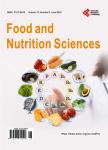Consumer Attitudes on Salt and Fat Reduced Foods in the Republic of Ireland
Consumer Attitudes on Salt and Fat Reduced Foods in the Republic of Ireland作者机构:The Sensory Group School of Food and Nutritional Sciences University College Cork Cork Ireland The Food Packaging Group School of Food and Nutritional Sciences University College Cork Cork Ireland
出 版 物:《Food and Nutrition Sciences》 (食品与营养科学(英文))
年 卷 期:2018年第9卷第7期
页 面:880-898页
学科分类:1002[医学-临床医学] 100214[医学-肿瘤学] 10[医学]
主 题:Survey Reduced Salt Fat Attitudes
摘 要:Public health campaigns are continually promoting healthier foods and in parallel many food manufacturers are working on recipes low in fat and salt. The following survey investigates how well consumers (n = 1045) in Ireland have assimilated the message of consuming healthier foods, including salt and fat reduced foods, into their diet. It seems that campaigns regarding the importance of a balanced diet have generally been adopted by respondents, as only a minority of the participants did not take care of their diet, independent of age, gender and level of education. More than half of the participants carefully maintained a balanced diet. Furthermore, an increase in purchasing salt reduced food was observed, though fat reduced food products were already better accepted. In general, men, young adults (30 years) and lower educated people purchased less salt and fat reduced foods and took less care in maintaining a balanced diet. No conflict was observed for traditional foods reduced in salt and fat content when their intrinsic sensory character is maintained. The majority of the participants were aware of the health risks of a diet rich in salt and fat, though less participants transferred this knowledge into their diet. A very high demand for more salt and fat reduced foods on the market was observed although the smaller range of salt and fat reduced products and their higher prices might diminish the level of consumer acceptance. Launching taxation and subsidies in tandem might counteract this and furthermore, user-friendly product labelling schemes are required.



